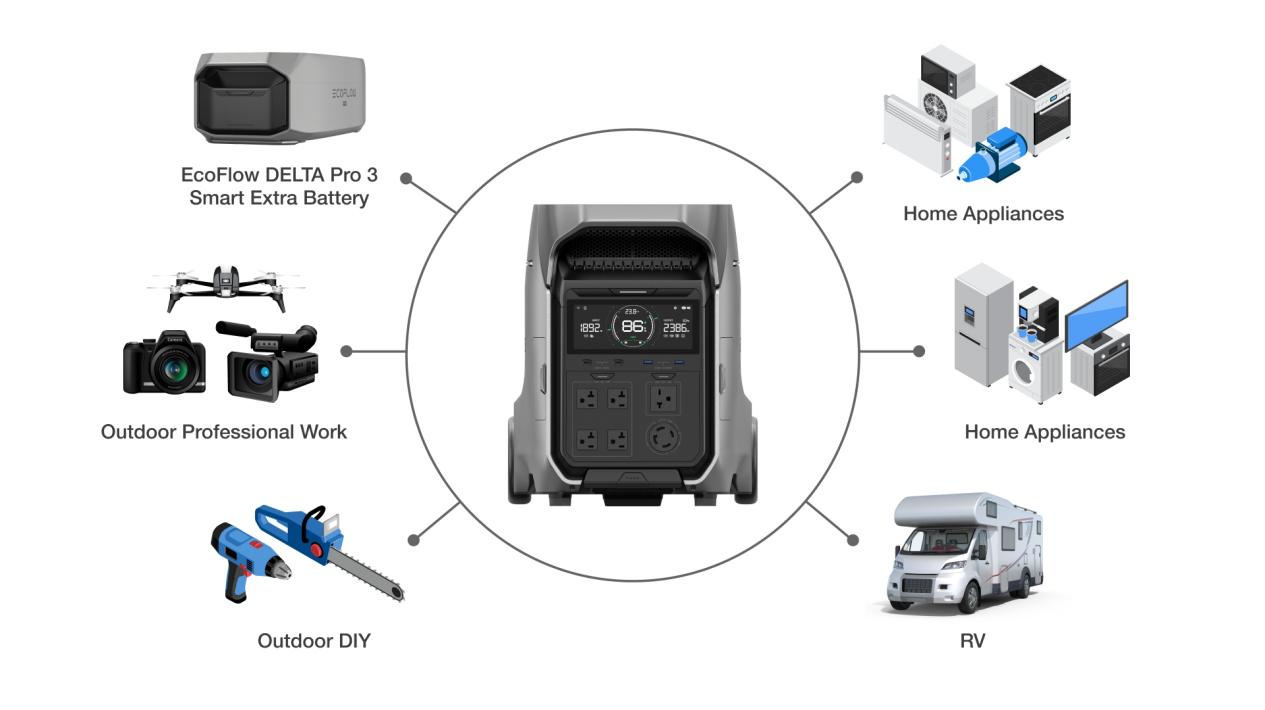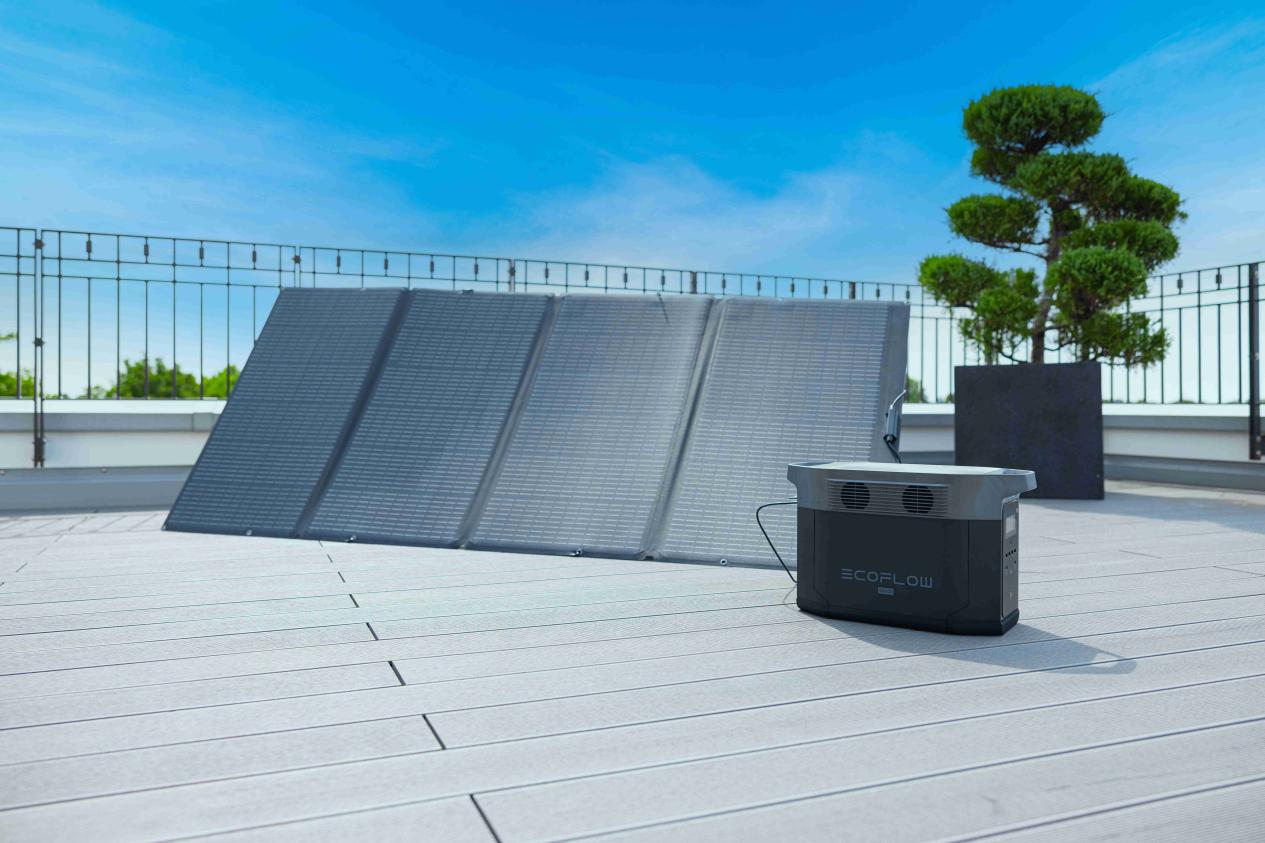Las Vegas Utilities: Average Electric Bill 2025 Update
- What's the Average Electric Bill in Las Vegas?
- Why Las Vegas Electricity Is More Expensive Than You Think
- Power Provider: Who Handles Electricity in Las Vegas?
- Peak Time, Peak Cost: How TOU Plans Affect You
- Electricity in Apartments vs. Houses vs. RVs
- Real Ways to Lower Your Las Vegas Electric Bill
- The Role of Backup Power: It's Not Just for Emergencies
- EcoFlow Portable Power: Save Energy & Bill
- Solar Integration: Las Vegas + Sun = Smart Energy Independence
- RV Power in and Around Las Vegas
- Common Questions
- Final Thoughts
Las Vegas is bright, dry, and hot for most of the year—and those qualities show up clearly in the power bill. Electricity usage here is higher than the national average. Especially in summer, where air conditioning isn't optional, managing your electric bill becomes more of a strategy than a habit.
If you're a new resident, a snowbird, or a local trying to cut costs, this guide walks through updated 2025 data, explains what affects your monthly cost, and introduces ways help reduce risk, control peak use, and add energy freedom.
What's the Average Electric Bill in Las Vegas?
According to the U.S. Energy Information Administration (EIA), Nevada's average residential electricity rate is 13.09 cents per kilowatt-hour as of early 2025. While the average monthly electricity bill across the state is around $115, power costs in Las Vegas tend to run higher—especially during the intense summer heat.
During peak summer months, residential energy use often exceeds 1,500 kWh/month, compared to the statewide average of 877 kWh. That puts real-world bills in the $140–$170 range for typical single-family homes, and often $250+ for large homes or properties with swimming pools.
Here's how that plays out across home types and seasons:
Home Type | Winter (Low Usage) | Summer (High Usage) |
Studio / 1-Bedroom | $60 – $90 | $100 – $130 |
2–3 Bedroom Home | $100 – $140 | $180 – $250 |
Large Home w/ Pool | $140 – $180 | $250 – $400+ |
Off-Grid RV (Solar) | Near $0 | Near $0 |
These figures are based on standard electricity pricing and typical usage patterns, using EIA's rate data and energy use estimates. In summer, cooling alone can account for over 60% of a home's power consumption, especially in older or less efficient buildings.
Why Las Vegas Electricity Is More Expensive Than You Think
Why the difference (compared to the state average) and why the high bills?
Because Vegas doesn't just get warm. It gets intensely, relentlessly hot.
And every extra degree past 95°F makes your AC system work exponentially harder to maintain a safe interior temperature.
Key reasons behind rising electricity costs:
- Prolonged summer season: Cooling needs can begin in April and last through October.
- Electric-based systems: Most Vegas homes use electric HVAC, electric stoves, electric water heaters—gas is less common.
- Poor insulation in older homes: Many 1980s–1990s houses weren't built with today's energy codes.
- Peak-hour billing: NV Energy Time-of-Use (TOU) plans penalize use between 1 PM and 7 PM—right when AC demand is highest.
- Appliance overload: Multiple TVs, streaming devices, refrigerators, pool pumps—all increase the base load.
Even if you're conservative with usage, structural inefficiencies and rising rates will catch up. And if you're renting, your power options are often limited by what's already installed.
Power Provider: Who Handles Electricity in Las Vegas?
Electric service in Las Vegas is provided almost entirely by NV Energy, the regulated utility serving southern Nevada.
As a resident, your electricity bill will reflect several components based on your rate plan.
- Flat-Rate Plan: Most residential customers are on a standard plan with a fixed per-kWh rate (about 11.1¢) plus multiple surcharges. While not tiered in the traditional sense, total cost rises slightly with higher usage due to usage-based fees.
- Time-of-Use (TOU) Option: NV Energy offers optional TOU plans, where electricity is cheaper during off-peak hours and more expensive—historically over 18¢/kWh—during peak times (typically 1 PM to 7 PM).
- Fixed Charges: A monthly base service fee of $18.50 applies to most single-family homes, with additional taxes and utility fees included on each bill.
As of 2025, the effective average residential electricity rate in Las Vegas is approximately 13.0-13.3 cents per kWh when all fees are considered.
If you run central air conditioning during peak periods on a TOU plan, your costs can rise surprisingly quickly, especially in the summer when demand surges.
Peak Time, Peak Cost: How TOU Plans Affect You
NV Energy offers TOU plans that charge based on when you use power—not just how much.
| Time Period | Typical Rate (per kWh)(est.) |
| Off-Peak (9 PM–7 AM) | $0.10–$0.11 |
| Mid-Peak (7 AM–1 PM / 7 PM–9 PM) | $0.13–$0.15 |
| Peak (1 PM–7 PM) | $0.18–$0.22 |
Running the washer or dishwasher during peak hours may not seem like much—but if your AC is blasting at the same time, you could burn through 30+ kWh in a single day. That's nearly $6 in electricity in just 24 hours. Multiply that by 30 days and you see how summer bills climb past $200.
Electricity in Apartments vs. Houses vs. RVs
Your type of living space plays a major role in your monthly power bill.
🔹 Apartments
- Smaller space = less cooling required
- Usually share walls = more thermal insulation
- Often includes utilities in rent (check lease)
🔹 Detached Homes
- High cooling loads, especially upstairs
- May run multiple AC zones, pools, water heaters
- Longer cable runs = more energy loss
🔹 RVs
On-grid (shore power) = billed by the park or plugged into house
Off-grid (battery/solar) = no ongoing costs
Solar setups avoid peak-hour surcharges entirely
The takeaway? A well-managed solar + battery RV setup can cost less than a studio apartment in the same city—and still provide comfort.
Real Ways to Lower Your Las Vegas Electric Bill
Even if you can't replace your HVAC system, you can still take steps to reduce power usage and avoid peak charges.
Everyday strategies:
- Set thermostat to 78°F or higher when home, 85°F when away
- Use ceiling fans and open windows at night when outside temps drop
- Avoid using ovens or dryers during 1–7 PM
- Close blinds or install thermal curtains to block daytime heat
- Clean AC filters every 30–45 days
- Switch from electric water heater to a hybrid unit (if you own your home)
If you rent, focus on plug-level controls—use smart power strips, unplug high-load devices, and consider a portable backup system to run appliances off-grid during peak periods.
The Role of Backup Power: It's Not Just for Emergencies
Power outages happen in Vegas. Whether due to demand surges, maintenance, or extreme weather, losing electricity in 110°F heat can go from inconvenient to dangerous.
But backup power isn't just about blackouts. Used wisely, it can help you shift loads away from peak billing hours and save money every single month.
That's where EcoFlow comes in.
EcoFlow Portable Power: Save Energy & Bill
EcoFlow designs smart, powerful, and scalable battery systems that store energy and deploy it wherever you need. Unlike gas generators, they're silent, indoor-safe, and recharge via wall outlet, solar panels, or car charging.
What you can power with EcoFlow:
Device | Runtime with EcoFlow DELTA Pro (3.6kWh) |
Window AC (800W) | 4–5 hours |
Full-size Refrigerator | 1–2 days |
Wi-Fi router + Laptop | 40+ hours |
CPAP Machine | 3–4 nights |
TV + Streaming Box | 20+ hours |
With higher-tier systems like the DELTA Pro + Smart Extra Battery, you can scale up to over 7.2kWh—enough to power a full-size home for essential loads during a blackout or to support an RV completely off-grid.


Solar Integration: Las Vegas + Sun = Smart Energy Independence
Las Vegas averages over 290 sunny days per year. That makes solar charging not only viable—but optimal.
All EcoFlow units are compatible with portable solar panels (110W, 220W, or 400W). You can:
Recharge daily from your balcony, patio, or roof
Keep essential gear running indefinitely
Completely bypass TOU pricing with solar + battery timing
Solar input of 400W can fully recharge a DELTA Max unit in 4–6 hours of direct sun. That's enough to run essential appliances on a clean energy loop—with no grid usage.
RV Power in and Around Las Vegas
Many RVers winter in Las Vegas or park long-term. If you're running off campground hookups, you're at the mercy of site-provided electricity—sometimes with usage caps or unexpected surcharges.
With EcoFlow, you gain:
Complete RV electrical independence
Portable solar recharges without rooftop panels
Quiet operation (no generator noise)
Enough juice to run rooftop AC, microwave, TV, lights, and more
💬 User Tip: Pair EcoFlow DELTA Max with 400W solar and a 30A power cord for a full-day off-grid RV setup—even in 100°F weather.


Common Questions
Q1: Is electricity expensive in Las Vegas compared to other cities?
Not necessarily by unit price, but the total bills often run higher. As of 2025, Las Vegas residents pay close to the U.S. average. But extreme summer heat leads to much higher usage, especially for air conditioning.
Q2: Do solar panels work well in Las Vegas?
Yes—Las Vegas is one of the best places in the U.S. for solar energy. The city receives over 290 sunny days per year, making it ideal for efficient solar panel performance. With high solar irradiance and long daylight hours, panels in Las Vegas generate more electricity per square foot than in most other cities.
Q3: What's the benefit of battery power if I'm not off-grid?
Even if you're connected to the grid, a home battery system gives you more control, flexibility, and savings:
- Avoid peak-hour pricing: With Time-of-Use (TOU) billing, electricity is most expensive during the day. A battery lets you charge during off-peak hours or with solar, then power your home when rates spike.
- Backup during outages: Blackouts still happen—especially during heatwaves or grid strain. A battery keeps your lights, fridge, and Wi-Fi on without a noisy generator.
- Smarter energy use: With systems like EcoFlow, you can track and automate energy flow, combining solar, battery, and grid input for maximum efficiency.
Final Thoughts
Las Vegas is a city built on energy—both metaphorically and literally. Electricity isn't a luxury here; it's a daily necessity. With power prices continuing to rise, and peak-hour penalties adding up, smart energy use is no longer optional.
EcoFlow gives you a way to:
Reduce reliance on the grid during high-cost hours
Stay prepared for unexpected outages
Control how, when, and where you use electricity
Whether you're in a small apartment, large home, or off-grid RV, portable battery power stations + solar opens up a new path—one where your comfort doesn't rely entirely on the grid.
For press requests or interview opportunities, reach out to our media team
media.na@ecoflow.com